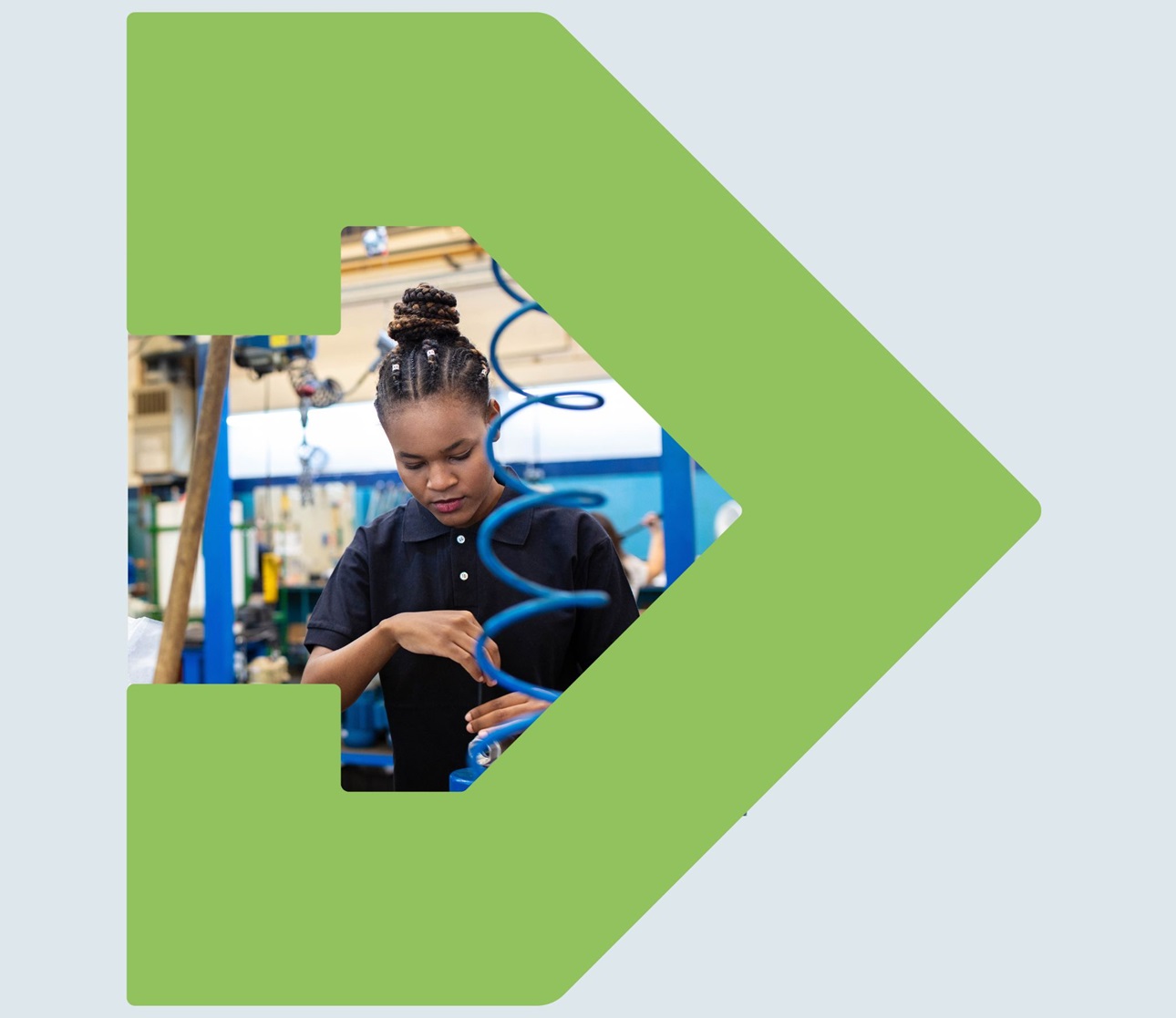
Economic Opportunity
Our Vision:
Every resident will be able to prepare for, and thrive in, a household-sustaining career by having equitable access to high-quality career exploration and education opportunities, resources, tools and supports.
Our Work:
Our Economic Opportunity pathway is developing an emerging approach that prioritizes:
• Promoting community strategies with residents, students and job seekers of color, to shape the career and lives they want
• Collaborating with an ecosystem of institutions, private sector and community-based organizations that support young people and workers in their career or job-related goals
• Grounding ourselves in equity, authenticity and humility as a convener, partner and advocate for the education-to-career continuum

In Focus: Postsecondary Pathways
In this video from our series on our pathways to equity, Associate Vice President Antoniya Marinova and Luciano Ramos, Director of Roxbury Community College's Center for Economic and Social Justice, lay out the planned work of the new Center and highlight the powerful message of housing it in the historic Dudley House.
At a glance:
The Economic Opportunity pathway has two focus areas:

Career Equity
Working through its longtime partnership with SkillWorks, Career Equity supports efforts to ensure that every resident has access to the training and support they need to find and maintain household-sustaining careers.
This includes supporting the development of high-performing job training as well as the supports workers need to fully utilize that training. Specific emphasis is on supporting programs and policies that improve job quality and eliminate barriers to career success and prosperity for BIPOC and other communities.

Pathways to Postsecondary Success
Strengthen education-to-career systems to put young people on a path to success through high school and into postsecondary education and careers of their choice.
In partnership with anchor organizations that are deeply committed to student success and well-being, Pathways to Postsecondary Success will coordinate and strengthen the ecosystem of programs and organizations that engage, educate and support young people in achieving success after high school. Seeking to build on-ramps, off-ramps and supports along the entire continuum, the focus area will elevate innovative and effective models and practices that enhance learners’ ability to succeed in Greater Boston.
Our Why:
For young people and adults, work and education represent two core places to hone and express their skills and passions. Yet, for all the successes the Boston region has seen in creating opportunities for residents, access to education and jobs has remained deeply uneven. After the Great Depression and during World War II, people of color—especially Black Americans—who wanted to build a better future for themselves and their families faced barriers in receiving public benefits. They were excluded from assistance like the GI Bill, which was key to developing America’s middle class.
Three decades later, in the mid-1970s, Boston made national headlines with busing and school desegregation policies. While students just wanted to learn, the narrative of busing masked discriminatory practices: racial covenants, redlining, white homeowners’ associations, “as well as the policies regarding school siting, districting, and student transfers that produced and maintained segregated schools.”
As wealthier white families left the city, lower-income families stayed with fewer housing, education and job options. By 2022, students from low-income families made up 71% of Boston Public Schools enrollment; 72% of enrolled students were Black or Latino and had lower graduation rates than white students. From K–12 to higher education, researchers have found inequalities in student outcomes at all points in Massachusetts education.
Inadequate and inequitable preparation, resources and supports lead to further gaps after high school. A report from the National Equity Atlas shows the Boston metro region is short on “good jobs” with family-sustaining wages for workers without college degrees, and workers of color end up disproportionately in lower-paying jobs. Even though higher levels of education help reduce unemployment, the racial wage gap remains starkly uneven. The lack of equitable employment opportunities harms quality of life for workers, families and communities.
The report also argues that inequitable employment opportunities for workers impair the region’s economic growth.
With mass layoffs, hiring freezes and shifts from full-time to part-time work at the height of the pandemic, millions of people in the U.S. faced life-altering changes. People of color―especially women of color―suffered the largest job loss nationwide and in Massachusetts. The shocks from unemployment and underemployment continue as communities recover from the crisis.
Although entry-level wages went up in response to the job shortage during the pandemic, the increase has created a double-edged sword. Higher pay has helped workers climb out of unstable financial situations—but it has also created shortages in training programs that could help workers progress in their careers.
Automated jobs continue to replace entry-level and lower-wage workers. For workers of color with fewer job opportunities, unequal access to training for in-demand skills, such as managing technology systems, adds another hurdle on the path toward a rewarding career.
Despite these challenges, our city has made gains in building stronger education and workforce strategies through strategic partnerships. While we see great need, the talent, aspirations and ambitions of young people and adults inspire us toward a more connected education-to-career continuum.
In this moment of change, we see a critical need to expand innovative, rigorous, coordinated and equitable educational and career paths that will benefit learners and workers in the Boston region.
